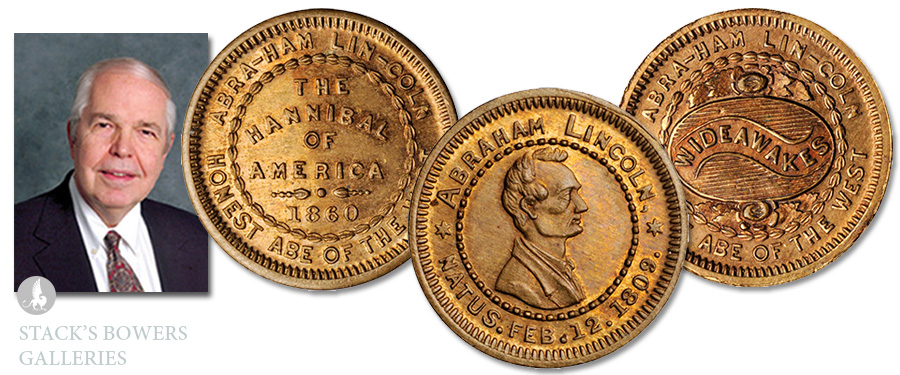
I have always enjoyed tokens and medals of all kinds and have collected, studied and written about many different types and varieties. One group that I find fascinating are the numismatic tokens and medalets issued from 1858 through 1860, during a craze for such pieces. While nearly all are scarce today and many are rare, many only cost in the hundreds of dollars, sometimes less.
Produced in this era was one of the most curious tokens ever made. The issuer was William Leggett Bramhall, born in Buffalo, New York, on June 26, 1839, a young numismatist who by 1859 had accumulated what was called the largest collection of American tokens and medals ever formed in an auction held that year. In 1859 he was curator of the collection of the new American Numismatic Society, but resigned when the Society decided to apply for a New York State charter, and the officers had to be of the legal age of 21.
Being of an inventive turn of mind, Bramhall commissioned George Lovett and, separately, the Scovill Manufacturing Company to strike tokens of his designs.
Abraham Lincoln was nominated for the presidency by the Republican Party at a convention held at the Wigwam in Chicago from May 16 to 18, 1860. Soon after learning of this, Bramhall had George H. Lovett create appropriate tokens to sell to collectors and otherwise distribute.
To be suitable for use on a token, a profile-view portrait of Lincoln was needed. Although the candidate had been photographed many times, including by the famous Mathew Brady in February, all were standing, sitting, or other poses than profile.
To get the right image Bramhall contacted a friend, George B. Lincoln (no kin to Abraham) in nearby Brooklyn. George knew Abraham and obligingly wrote to the candidate in Springfield, Illinois to have a special profile photograph taken. Lincoln portraits have been carefully studied. The Face of Lincoln, by James R. Mellon, 1979, illustrates the “Springfield portrait” but does not identify the photographer or mention Bramhall, who commissioned it. His text: “Solio print of a lost albumen print from the lost original negative made by an unknown photographer, probably between February and August 1860, Allegheny College.” Fred Reid’s book, Abraham Lincoln: The Image of His Greatness, illustrates the Bramhall token of Lincoln but says nothing about the source of the portrait.
The tokens measured 19.2 mm, the size of a current cent. The inscription, which included THE / HANNIBAL / OF / AMERICA at the center of the reverse, was very controversial.
A letter from Bramhall to the American Journal of Numismatics, July 3, 1867, gave this:
In May 1860, immediately after the nomination of Abraham Lincoln for president, I obtained—through the kind assistance of my friend, George B. Lincoln, of Brooklyn—a profile photograph of his honest face, which was taken at Springfield for my special purpose. I engaged the services of Mr. George H. Lovett, of New York, who immediately commenced engraving the dies for a small medalet, which soon after appeared, and it was the first—and bore the best likeness of Mr. L.—among the very many issued during that long and exciting political contest.
I will describe it, though perhaps imperfectly, as follows
Obverse: A profile bust of Abraham Lincoln, in citizen’s dress, facing to the right, and surrounded by a dotted circle; Legend: “Abraham Lincoln. Natus. Feb. 12. 1809”.
Reverse: Inscription: “The Hannibal of America • 1860,” within a wreath; Legend: “Abra—ham Lin—coln Honest Abe of the West.” Edge plain.
Of these, only 7 pieces were struck in silver, 35 each in copper, brass, and tin, and 250 in nickel,—inclusive of specimens retained by Mr. Lovett.
The appropriateness of the inscription used for the reverse, was, at the time of its issue, severely criticized by some. Although there was nothing then foreshadowed in the character of Mr. Lincoln to warrant his comparison to the Carthaginian warrior, it was intended to illustrate his reputed boldness, and his success, in political warfare; and at the same time to inscribe, in conjunction with the two syllables between the hyphens in the legend, the full name of his associate upon the ticket. The hyphens referred to in the legend were designed to exhibit the singular fact that the last syllable of the Christian name and the first of the surname of Mr. Lincoln comprised the surname of his “political lieutenant,” Mr. Hamlin. This was the first political medalet struck in nickel of uniform size with the nickel cent.
Before the close of the political contest referred to, there being a demand for a quantity of these medalets, and the reverse die having been injured, that die was altered by substituting for the legend an oval shield hearing on a scroll “WIDEAWAKES”—above and below it, a rose and leaves. Of this new type there were struck but 21 pieces in silver; 35 each in copper, brass, and nickel; and about 1,500 in block tin. The reverse die of this medalet has since been destroyed by myself.
These tokens caused great excitement and interest in their time.
The Wide-Awakes (usually hyphenated) were enthusiastic Lincoln supporters who held parades in the East and Midwest.
William Leggett Bramhall left New York City, enlisted in the Union Army, was wounded and discharged. He relocated to Washington, D.C., where he became prominent as an attorney, as a government official in the office of deputy collector of taxes, Grand Army of the Republic veterans’ affairs, real estate, and in other activities. In 1871 William L. Bramhall & Co. was the agent for the Niagara Fire Insurance Company and the Republic Fire Insurance Company, both of New York. His office was 729 Seventh Street N.W.
Bramhall died suddenly of a heart attack in his residence at 2112 O Street in the morning of February 17, 1902.
Interesting fact: To strike the copper-nickel pieces Lovett obtained cent planchets from the Philadelphia Mint!





